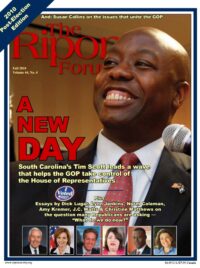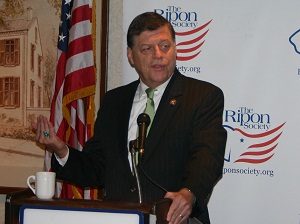
WASHINGTON, DC — The Ripon Society hosted a breakfast briefing on Thursday, November 4th to review the results of the mid-term elections and discuss the reasons Republicans had, electorally speaking, one of the most successful years in the history of the GOP.
The breakfast featured some of the leading political minds in Washington, including: Congressman Tom Cole, who represents the 4th District of Oklahoma in the House of Representatives and previously served as Chairman of the National Republican Congressional Committee; Rob Jesmer, the Executive Director of the National Republican Senatorial Committee; Guy Harrison, the Executive Director of the NRCC; Linda DiVall, a veteran pollster for the GOP; and former Congressman Tom Reynolds, who represented the 26th District of New York in the House from 1999 to 2009 and, like Cole, previously served as Chairman of the NRCC.
“We’re in a remarkable period,” Cole stated. “We came out of 12 years – five straight elections really, from 1994 to 2006 – where neither side [Republican or Democrat] gained more than 10 seats. There was no double-digit election in that time frame. We’ve had three double-digit elections in a row. You just look at the loss of seats the Democrats suffered on Tuesday and the two elections previously. You can argue that this one is greater than the last three put together. They literally lost all the ground they gained and then a little bit more. That tells you there’s something going on out there that’s a lot bigger than campaign tactics, decisions, what have you.”
“I think our team did a great job. But I’ve also got to say there was worthy competition on the other side. It’s not like we beat a slouch team. You can’t say it was 1994 and they didn’t see it coming. They were ready. They were as ready as they know how to be. For us going forward… we’ve got to remember – we’re still not the governing party by a long shot. We don’t govern, but we do have to deliver, I think, very quickly. There’s nothing in the numbers to suggest we got elected because we’re popular. Nobody in Washington is very popular. It’s not an embrace of the Republican agenda, so we’re on a very short leash.”
There’s nothing in the numbers to suggest we got elected because we’re popular. Nobody in Washington is very popular. It’s not an embrace of the Republican agenda, so we’re on a very short leash.
“We’ve got to be perceived as working — and I think our leader [John Boehner] has done this really well — to get big problems solved and done for the American people in the next two years.”
Jesmer, who as Executive Director of the NRSC was in charge of the Senate’s effort this election, said that: “We obviously had a great night. We won six Senate seats. We retained all of our open seats and our Republican seats, and picked up top places like the President’s home state and his seat in Illinois.”
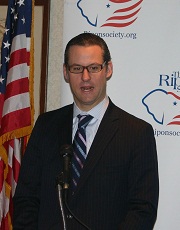 Jesmer also discussed some of the tougher challenges his organization faced on election night. “I’m still disappointed about Colorado,” he stated, adding that: “I always say when you lose narrowly it’s much more difficult than getting crushed. So, when you lose by 20,000 votes, that makes it kind of a tough pill to swallow.”
Jesmer also discussed some of the tougher challenges his organization faced on election night. “I’m still disappointed about Colorado,” he stated, adding that: “I always say when you lose narrowly it’s much more difficult than getting crushed. So, when you lose by 20,000 votes, that makes it kind of a tough pill to swallow.”
Teamwork and pressure-oriented tactics
As Executive Director of the NRCC, Harrison oversaw GOP efforts to recapture the House – an effort, he said, that was not so much aided by the political wave, but one that prepared for and, ultimately, took advantage of it.
“I think what we learned,” he said, “is that, obviously, the wave has happened. But you either amplify or miss opportunities based on being prepared. And I’m proud of what the NRCC was able to do and be prepared for a wave. You know, you can’t build the weather, but you can take advantage of it. And I think there are two things this NRCC team and especially the Member team built ourselves on – teamwork and pressure-oriented tactics.
“I am very proud of the fact that there is in this victory almost every single Member can take gratification that they were part of it. We had massive Member involvement, from recruiting to mentorship to actually paying their dues and assessments. We had an assessment goal of $65 million, and we actually surpassed it and got to $75 million. I take great pleasure in knowing that every single member can pat themselves on the back and say they were part of this process.”
I take great pleasure in knowing that every single member can pat themselves on the back and say they were part of this process.
With regard to the pressure-oriented tactics the NRCC applied this election year, Harrison said the tactics, and the strategy behind them, had their genesis in a vote held in the Capitol in early 2009. “If you look back at their [the Democrats’] demise,” he said, “you can look back to one day. It was a group of members standing up and saying, ‘You know what? Obama has 65% job approval, we’re in tough economic straits, but this economic stimulus plan is complete bunk and we’re all voting against it.’ That was the day it started unraveling for them.”
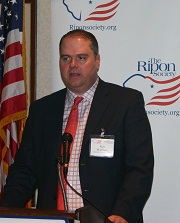 He added: “We beat 36 out of the 48 McCain Democrats. Seats like Ike Skelton. We were finally able to take out some of the Democrats who have been defying gravity for a decade.” According to Harrison, these victories in particular will make it easier to hold seats after redistricting because voters in districts like Skelton’s want to vote for a conservative.
He added: “We beat 36 out of the 48 McCain Democrats. Seats like Ike Skelton. We were finally able to take out some of the Democrats who have been defying gravity for a decade.” According to Harrison, these victories in particular will make it easier to hold seats after redistricting because voters in districts like Skelton’s want to vote for a conservative.
Harrison concluded on a note of optimism about the incoming House leaders and the election of 2012. “I think we have a leadership team that’s going to make sure we have a great message to talk about in two years.”
Quality candidates on the playing field
Linda DiVall began her remarks by quoting Marco Rubio. “Voters did not embrace the Republican Party,” she quoted the newly-elected Senator from Florida as saying. “They merely gave us a second chance.” To that end, she expressed her belief that the GOP has a “tremendous responsibility right now, and we need to conduct ourselves in a manner that is just, that we certainly learned some lessons from how we lost the majority.”
DiVall then proceeded to reel off a host of facts and figures that made clear how deep the GOP victory was. For instance, she noted that the favorable/unfavorable rating of the Democrat Party was 43/52, while the favorable/unfavorable rating of the Republican Party was 41/53. As a result, she stated, one of the key questions that she and other Republicans had asked themselves over the past two years was whether the GOP could win a national election when the perception of the party was so negative.
“It’s very difficult,” she said, “and you can only do that when you have quality candidates on the playing field. And I think one of the things you have seen is the candidates themselves are younger, more diverse and less likely to be, frankly, political hacks. They come from different stripes of life, representing their communities and their neighborhoods much better. And that helped to change the perception of the party.”
Besides stellar candidate recruitment on the GOP’s part, DiVall attributed the Republican’s victory to the fact that: “Democrats overplayed their hand when it came to the role of government. In 2008, 51% said government shouldn’t do more – just like we saw in ’92 when Clinton overplayed his hand. When we regained the majority in 1994, you saw it swing back, where a majority said the government was doing too much. In 2010, 56% stated that the government was doing too much. They voted 21% Democrat and 76% Republican.
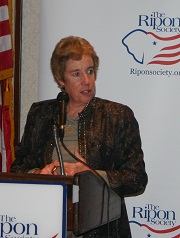 “This allowed the Republicans to play into the wrong-track sentiment. One of the goals of every single campaign was to win the wrong-track voters decisively. By Labor Day, campaigns were getting 55-60% of the wrong-track vote. During the fall, they were able to accelerate that, according to the exit polling data, and on Election Day we found that Republican candidates won 75% of wrong track voters. So, it’s very difficult to win a national election for the Democrats when 61% are saying things are off on the wrong-track and the minority party is getting 75% of the wrong-track vote.”
“This allowed the Republicans to play into the wrong-track sentiment. One of the goals of every single campaign was to win the wrong-track voters decisively. By Labor Day, campaigns were getting 55-60% of the wrong-track vote. During the fall, they were able to accelerate that, according to the exit polling data, and on Election Day we found that Republican candidates won 75% of wrong track voters. So, it’s very difficult to win a national election for the Democrats when 61% are saying things are off on the wrong-track and the minority party is getting 75% of the wrong-track vote.”
…it’s very difficult to win a national election for the Democrats when 61% are saying things are off on the wrong-track and the minority party is getting 75% of the wrong-track vote.
DiVall also pointed to another significant factor that contributed to the Democratic defeat – the President and his policies.
“Obama was a significant problem [for the Democrats],” she said. “His approval rating among those who voted on Election Day was 45% approve, 54% disapprove. The ‘disapproves’ voted 85% for Republican candidates. But most important was his policies. Twenty-four percent stated their vote was one of support for Obama, while 37% stated their vote was one in opposition to Obama. Forty-four percent said Obama’s policies would help the country. Fifty-two percent said Obama’s policies would hurt the country. So that is really a lot to overcome.”
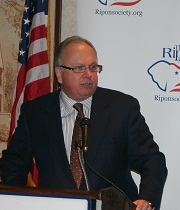 DiVall concluded her remarks by discussing one other key to this year’s election – the fact that political independents, who have supported Democrats over the past six years, favored the GOP by a vote of 57% to 39% this time around. “It’s the first time since 2004 that independents came back and decisively voted for Republicans,” DiVall declared. “And that’s going to be the key thing to monitor in this next election.”
DiVall concluded her remarks by discussing one other key to this year’s election – the fact that political independents, who have supported Democrats over the past six years, favored the GOP by a vote of 57% to 39% this time around. “It’s the first time since 2004 that independents came back and decisively voted for Republicans,” DiVall declared. “And that’s going to be the key thing to monitor in this next election.”
Former Congressman Reynolds wrapped up the discussion by talking about “40-12-4,” noting it took Republicans 40 years to win the majority, 12 years to hold it, and 4 years to win it back. He praised both the NRCC and NRSC for their role in securing these victories, and singled out in particular the recruitment efforts of both committees as well, saying: “You can’t win if you don’t have candidates.”RF



